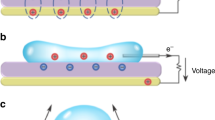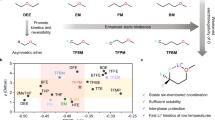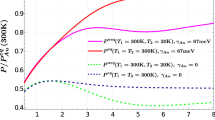Abstract
I WISH to take the earliest opportunity of responding to the courteous letter of M. Lippmann, which appears in the current issue of NATURE, with the acknowledgment that his quotation from the Comptes rendus of 1876 establishes in the most conclusive manner his priority of date in the enunciation of the doctrine of the Conservation of Electricity. As to my own independent enunciation of this doctrine, it was arrived at without any knowledge of the comparison drawn by M. Lippmann in 1876 between the cyclical flow of heat (of Carnot's theorem) and the cyclical flow of electricity. I approached the matter upon somewhat different and less clearly defined lines, and finally struck upon the fundamental notion of the Conservation of Electricity when endeavouring to think out the relations between electromotive and ponderomotive force in an electric theory of radiation based upon Clerk-Maxwell's Electromagnetic Theory of Light. My speculations on this point were committed to writing some weeks ago, and will shortly be published. I content myself in the meantime with pointing out how near Clerk-Maxwell came to a similar conclusion. In Article 35 of his well-known treatise, he says emphatically: “While admitting electricity, as we have now done, to the rank of a physical quantity, we must not too hastily assume that it is, or is not, a substance, or that it is, or is not, a form of energy, or that it belongs to any known category of physical quantities. All that we have hitherto proved is that it cannot be created or annihilated” (the italics are mine). Nevertheless the immediate and logical conclusion that electricity, like matter and like energy, is subject to a law of conservation, appears to have been rejected by Clerk-Maxwell for reasons explained in Article 574 of his treatise, consequent on his inability to discover whether an electric current possessed momentum or could exert a mechanical reaction upon the matter of the conductor through which it flows. The unfortunate dilemma which suggested this experiment could hardly have been raised if it had then been as clearly understood as it now is that there is the same distinction between electro-kinetic and ponderokinetic energy as between electromotive and ponderomotive force. But to discuss this matter further would lead me to take up too much space.
This is a preview of subscription content, access via your institution
Access options
Subscribe to this journal
Receive 51 print issues and online access
$199.00 per year
only $3.90 per issue
Buy this article
- Purchase on SpringerLink
- Instant access to the full article PDF.
USD 39.95
Prices may be subject to local taxes which are calculated during checkout
Similar content being viewed by others
Author information
Authors and Affiliations
Rights and permissions
About this article
Cite this article
THOMPSON, S. The Doctrine of the Conservation of Electricity. Nature 24, 164 (1881). https://doi.org/10.1038/024164c0
Issue date:
DOI: https://doi.org/10.1038/024164c0



